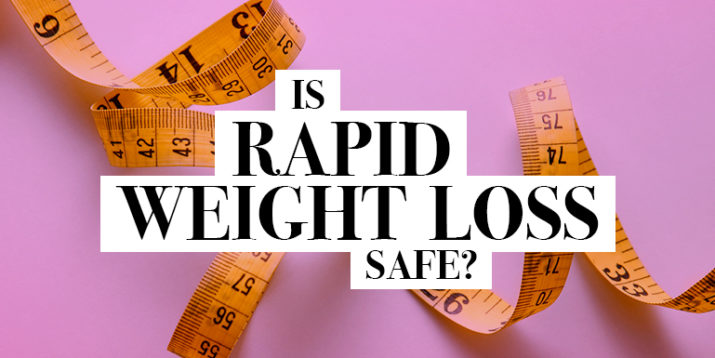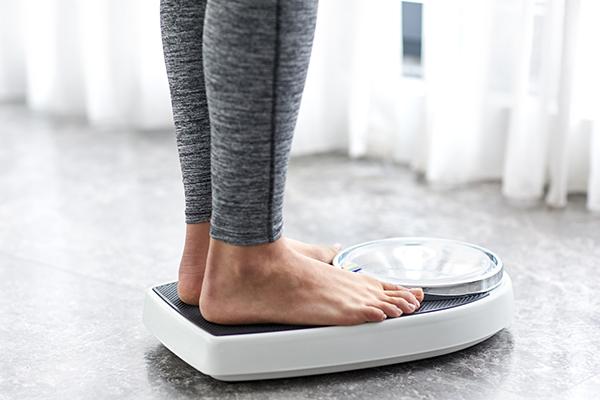Is Rapid Weight Loss Safe for My Health?

The Ultimate Beachbody Guide to Weight Loss
Can’t Lose Weight? | How to Start | Make it Easier | What to Eat |
Weight Loss Workouts | Maintain My Weight
Plenty of popular diets and supplements on the market promise that you can lose weight quickly and keep it off. It sounds a little too good to be true, but we’ve all heard it before: “Lose 10 pounds in 10 days!”
But can you really drop weight this fast? And if you can, is rapid weight loss safe?
How Fast Should I Lose Weight?
Most people who want to lose weight want it to happen quickly. While that’s understandable, the most common advice is to slim down slowly.
But how slow is “slow”? Generally, experts suggest that healthy weight loss is the gradual loss of about one to two pounds per week. Losing weight faster than this can be considered “rapid.”
It sounds practical enough, but what if you have a lot of weight to lose, such as upwards of 100 pounds?
“Those with a lot of weight to lose should strive to lose one percent of their body weight per week on average,” says Sasha Coefield, MPH, RD, LDN, a weight-loss expert at the Wake Forest Weight Management Center. In that scenario, someone who weighs 300 pounds or more would aim to lose 3+ pounds per week.

Reasons Why You Should Lose Weight Gradually
Two main reasons underlie the recommendation to lose weight at a slow and steady pace:
Less weight regain
Evidence suggests that losing weight at a gradual pace can help prevent the dreaded weight regain.
It’s more realistic
Losing weight — and keeping it off — requires significant, permanent lifestyle changes. Making too many drastic changes all at once can set you up for failure. The changes that you make have to be ones that are sustainable, which is why implementing a few small changes at a time can increase your chances of success.
Reasons Why You Shouldn’t Lose Weight Quickly
The race against the clock to drop those last five pounds feels very real just days before your bikini competition, wedding day, or high school reunion.
But losing weight rapidly requires pretty severe changes to your daily routine and for most people, these aren’t sustainable or practical. Here are three common ways to lose weight fast — and why they aren’t the best way to drop pounds and keep them off:
1. “Starvation Diets”
The fastest route to slashing pounds is to eat nothing or virtually nothing. “Starvation diet” is a blanket term for diets that are mostly liquid, with little to no solid food. Yes, you’ll lose weight — because you’re not eating anything of substance.
What’s really happening is that you’re (temporarily) losing water weight. But you’ll also be losing muscle as well, which you don’t want. You will lose some fat, but a minimal amount.
The loss of water can be worsened by frequent urination if you’re also drinking salt water, lemon juice, maple syrup, cayenne pepper and a laxative tea. Bad news: You’ll rapidly regain all this weight once you resume your normal eating habits.
2. Very Low-Carb Diets
Just as with “starvation diets,” low-carbohydrate diets like the ketogenic diet (high fat) or the Atkins diet (high protein) can lead to rapid weight loss at the beginning but, again, most of it isn’t fat loss at all — it’s actually water.
You see, our liver and muscles carry glycogen, the stored form of your body’s primary fuel source, glucose, which is restocked by eating carbs. For every one part glucose that’s stored, your body stores three parts water. When you’re on a low-carb diet, you don’t replace all of the glycogen you use, causing you store less water as well.
The result can be encouraging when you step on a scale, but the effect is temporary — as soon as you start eating more carbs, the weight will return. Both ketogenic and Atkins can go low as 20 grams of carbohydrates per day. To give you perspective, you get more carbs from a small, six-inch banana.
3. Weight-Loss Supplements
Be wary of supplements with ingredients like yohimbe, Garcinia cambogia, guar gum, and hoodia. For these, there’s more evidence of negative side effects than weight-loss effectiveness. It’s possible to lose weight with supplements containing these ingredients, but it may be because the adverse effects, which include GI-related issues like diarrhea, nausea, and vomiting.

Pros and Cons of Losing Weight Quickly
To help you better understand the murky waters of rapid weight loss, here’s a quick roundup of the pros and cons:
PRO: You may regain less weight and end up at a lower weight
This “pro” is controversial because it challenges our deep-seated belief that large, rapid weight loss is associated with poorer long-term weight outcomes compared to slow, gradual loss.
According to a 2013 New England Journal of Medicine article, many weight-loss trials show that losing a lot of weight initially is linked to lower body weight over time. One of the trials is a study of 43 obese adults; it found that those who dropped weight rapidly (3.5 pounds per week) were more successful at maintaining that loss than those who dropped 1.8 pounds per week.
Both groups achieved a similar loss of 30 pounds, but the rapid losers were able to keep more off over time. This effect was seen after two years, even if not at a statistically significant level. Weight loss maintained by the rapid losers was five pounds more after one year and seven pounds more after two years.
PRO: You may see a jolt of motivation from rapid weight loss
“The jury may still be out on whether the rate of weight loss actually helps with success, but one thing is clear: My most successful patients are those who view weight loss as a lifestyle change,” says Coefield.
Eventually, those changes will need to become permanent commitments if you want to maintain that loss, but seeing those pounds slide off quickly at the start can be psychologically reinforcing. It shows you that the changes you’ve made are working and encourages you to see how far you can take it.
CON: You risk malnutrition and dehydration
If you’re dropping weight quickly in an unhealthy manner, you may be putting yourself at risk of malnutrition, a condition in which you’re not eating enough calories or micronutrients (e.g. vitamins and minerals) — or both. If your diet isn’t balanced with the proper amounts of carbs, protein, and healthy fats, you’re probably not eating enough of the nutrients your body needs to thrive.
The number of calories you need on a daily basis to lose weight depends on an array of factors, including age, gender, height, genetics, and level of physical activity. Generally, your daily calorie intake shouldn’t fall below 1,200 calories; any less than that threshold can be dangerous in the long-term. Plus, since we get about 20 percent of our fluids from food, this can also increase your risk for dehydration.
(For reference, the USDA recommends 1,800 to 2,400 calories per day for women (age 19-50) and 2,200 to 3,000 for men (age 19-50), depending on your level of daily activity — sedentary, moderately active, and active.)
The Bottom Line
Ultimately, you should focus more on the methods you’re using to lose weight — eating a healthy, balanced diet and exercising regularly (including strength training) — than on the speed at which the weight is coming off. I know it’s corny, but the journey counts just as much as the destination, especially if you want results that will last.
Chapter 2: How to Start Losing Weight

